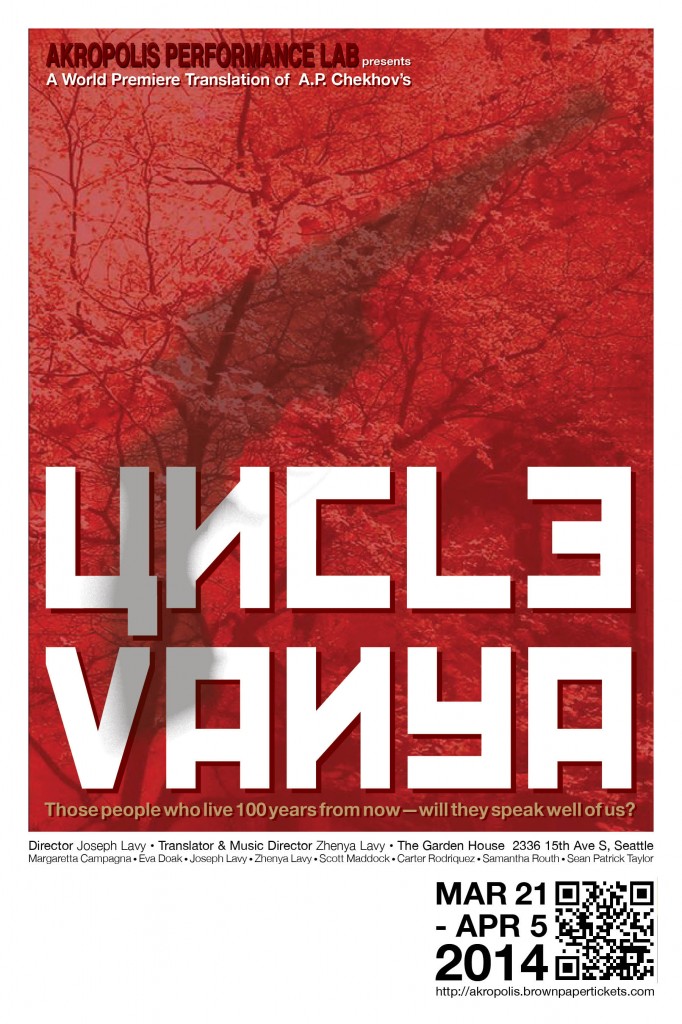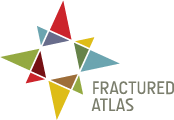Immediately establishing itself as a production based upon strong physical movement, it rises high above virtually any other production of Chekhov or indeed anything else in Seattle.
~ Omar Willey, Seattle Star, Review: “Burying the British: Uncle Vanya”
“Those people who live 100 years from now … will they speak well of us?”
APL presents Anton Chekhov’s Uncle Vanya, in the world premiere of a new translation by Zhenya Lavy, at the historic Garden House on Beacon Hill. Continue…
Residents of a country estate find their lives upended when their ailing, estranged patriarch and his beguiling, young wife retire from the city to live among them. Provoked by the interlopers’ entitlement and malaise, they confront disillusionment, environmental decay, unrequited love, and deferred dreams. Haunted by the past, present, and future, these unhappy souls wait, talk, drink, philosophize, and reach—with increasing desperation—for illusory fulfillment. Simultaneously tragic and comic, sympathetic and absurd, Uncle Vanya probes at timeless, universal questions of the human soul to reveal what is difficult and true.
As in all APL productions, the text, song, and action are inextricably linked. Only at the union of these elements is the story fully manifest. Striking physicality and saturated, complex vocal music are hallmarks of any APL event. Directed by Joseph Lavy, and featuring the rich a cappella polyphony of Russian folk music arranged and directed by Zhenya Lavy, Uncle Vanya reasserts APL’s powerful artistic range.
REVIEWS: [catlist name="Review+Uncle Vanya" orderby=date order=dec]
WHERE: The Garden House – Washington State Federation of Garden Clubs’ Headquarters on Beacon Hill, 2336 15th Ave S, Seattle WA 98144
WHEN: March 21 – April 5, 2014 The production runs 2:20, with 1 intermission. Doors open 30 minutes before curtain.
SPECIALS:
- PWYC is March 22, 4 p.m.
- Industry Night: March 27, 8 p.m.
- Actor Benefit Performance is March 27, 8 p.m. – all revenue goes directly to performer stipends
- Advance: $20 general / $15 students & seniors via Brown Paper Tickets (1-800-838-3006, http://akropolis.bpt.me)
- Door: $22 general / $17 students & seniors (cash or credit). Onsite sales begin 30 minutes before curtain.
CAST:
- Margaretta Campagna ~ Sonya
- Eva Doak ~ Mrs. Voynitsky
- Joseph Lavy ~ Vanya
- Zhenya Lavy ~ Marina
- Scott Maddock ~ Serebryakov
- Carter Rodriquez ~ Astrov
- Samantha Routh ~ Elena
- Sean Patrick Taylor ~ Telegin
DIRECTOR: Joseph Lavy, APL co-artistic director
MUSIC DIRECTOR & PRODUCER: Zhenya Lavy, APL co-artistic director
ASSISTANT DIRECTOR: Annie Paladino
STAGE MANAGER: Jeanette Sanchez-Izenman
SOMETIMES THE WORK PICKS YOU
It started as a Sunday Salon reading… a particularly well-cast Sunday Salon reading. By evening’s end, with the play read and discussion winding down, there was agreement in the room: Akropolis needed to produce Uncle Vanya as its next major work. But APL has traditionally produced original or highly adapted works. What would it mean for APL to bring Chekhov’s classic to life and make it their own? A new translation with the raw vitality of the Russian. A musical setting to complement and comment upon these “Scenes from Country Life.” An intimate staging to bring audiences into immediate confrontation with the humorous and tragic in Vanya’s human condition. We open almost a year to the day since that reading. Come discover what the year has wrought!






Trying to describe the bookends of the chests entering and exiting the stage to my wife was surprisingly emotionally difficult. Those images tied together and–supported by the weight of the work itself–packed a punch. The performance so beautifully layered sound and movement and voice and touch throughout. It made moments that could have easily felt manufactured into something real and sharp. For some time, I’m going to be looping so many of the small interactions in my mind as they digest their way through me.
The script was tight and, yet, vibrant. I’ve seen the play several times in the past and was expecting something that felt much slower in pace. Instead, the dialogue felt–if not brisk, at least very alive. It seemed odd only in one place for me: when Waffles said his name in Russian (?), and then parenthetically translated it. Who was he translating for? Why not just say it in English like everyone else? But that’s the only small time I found myself questioning the language. Overall, quite a nice change from my expectations.
Staging-wise I felt the space was used extremely well (though the audience seating was, perhaps, a touch uncomfortably close). The window bench, windows, and glass door were delightfully perfect for the piece and were used to great effect. Having the stairs visible through the glass doors was also nice and well-used. And the closing (or not) of the glass doors themselves felt well-planned and made me question the meaning and motivations of characters who passed through them (slamming the door or not). Incidentally, I wasn’t entirely sure of what was behind the audience in terms of playing space, however–the center aisle was the door to outside, but the side aisle and the door by the theatre entrance (both used a few times?) never resolved themselves in my mind as locations (if they were supposed to be?).
The transitions to the picnic blanket and the bedroom worked perfectly and created some of the nicest and most intimate moments (while still being in the middle of the stage). The bedroom scene between the two women (head in lap) was thoroughly enjoyable. As was the drunken scene between the men. As was the creation of the chimes. As was the initial entrance of Vanya (though I wished the chests had been pulled further onto the stage simply for selfish reasons–by the time I fully saw it happening the pulling was over).
The work was absolutely rife with a rich musicality–from the moment the Doc began writing (scratch scratch scratch), to the clicks of the door, to the amazingly-effective wind chimes (the creation of which was magical). And, of course, the amazing music itself (the often discordant and even overwhelming power of worked in excellent contrast to the stage actions when it didn’t fully support it). What I think most fascinating is that I left the production simultaneously thinking about the awful silence and nothingness these characters lived in… while still marveling at the quantity of sound and music that infused the piece.
A few nitpicky things: I do wish the shades behind the knitting corner had been pulled–the glow of the Shell gas station lights outside were a minor irritant that could have easily been remedied. And I wish the piano had been pushed slightly away from the wall for better visibility during the brief scenes where things happened there (my half of the audience simply missed whatever happened in that corner). As I mentioned, I loved the opening and closing segments and I wish that that more figurative style had been more-evenly spread throughout the piece. There were excellent moments when it reappeared–such as Vanya’s forward-roll off the chest, his manic dis-robement, or the wind-chime-creation and rattling, for instance–that felt very good, but that the same time slightly lonely.
Vanya himself was both powerfully and subtly performed. But, what I was most pleased to see was that similar energy and detail could be found throughout the cast. It’s a testament to the strength of Akropolis’ slow-cooked method (images of a rich stew–both tender and flavorful–float up in my mind).
Anyway, I look forward to Akropolis’ Charlie Brown. (wink wink. nudge nudge.)